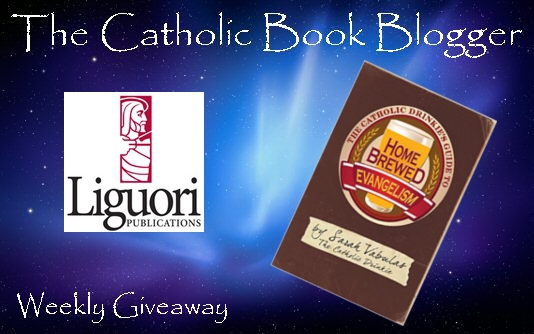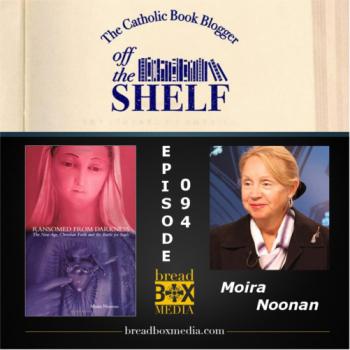 Sarah Vabulas is known throughout the blogosphere as “The Catholic Drinkie”. The Catholic Drinkie’s Guide to Homebrewed Evangelism
Sarah Vabulas is known throughout the blogosphere as “The Catholic Drinkie”. The Catholic Drinkie’s Guide to Homebrewed Evangelism is a unique gem which validates the statement commonly attributed to G.K. Chesterton, “In Catholicism, the pint, the pipe and the Cross can all fit together.” Sarah states in the introduction that:
“In these pages I’ve tried to offer a little of everything so you can sample the different flavors of beer and faith. You can pick up the book and read the beginning, or you can jump around and find the sections that appeal to you most. You’ll find a little of everything from Scripture, to saints, to evangelizing the faith, to some good homebrew recipes you can enjoy regardless of your faith”.
Sarah leads off the book with an interesting section on the history of alcohol and the Catholic Church. Alcohol at times gets a bad wrap thanks to situations where it is not used in moderation. It must be noted that alcohol consumption is not a bad thing. Just like anything else, it can be abused. However the church has had a long history with alcohol starting with Jesus and the Wedding feast of Cana. Jesus, at the request of his mother Mary, saves the family from the embarrassment of running out of wine. Not only did Jesus miraculously turn water into wine, he turned it into the best wine on earth. It is believed that the six stone jars yielded between 120 and 180 gallons…..a celebration indeed.
“Some look down on drinking in any form, professing its evil nature and encouraging those around them not to imbibe. I have been accused of promoting alcoholism through my evangelization. Jesus was also reprimanded for drinking during his public ministry, as we see in Matthew’s Gospel. “The Son of Man came eating and drinking and they said ‘Look, he is a glutton and a drunkard, a friend of tax collectors and sinners’” (Matthew 11:19). But as we see in the wedding story and others throughout the Bible, the picture of drinking in moderation as celebration of a festive occasion is one of joy, not rebuke.”
Next Sarah delivers a very interesting chapter on the use of wine during the Mass. The use of wine “symbolizes the giving of ourselves to God in freedom and in obedience, as we learned in the Wedding at Cana”. This chapter included a nice list of types of wines and their descriptions commonly used by churches. This first part of the book is rounded out by a chapter on patron saints of beer and wine. These include brief summaries of their life and what they are the patron saint of. This list of saints includes: St. Arnulf of Metz, St. Arnold of Soissons, St. Amand of Maastricht, St. Augustine of Hippo, and St. Brigid of Kildare.
If you have any interest in craft beers than Section 2 is the section you will want to start with. Sarah delves into the history of monks and their beers. She pays particular attention to the Trappist monks and their certified Trappist breweries from around the world. There are ten breweries that carry the Authentic Trappist label and she details the history of each and their beer offerings.
Sarah also covers how social events and home brewing can be used as a source for evangelization. She touches upon developing fellowship over common interests of craft beer. This could be accomplished through a weekly gathering at a local pub or even better is to form a group of individuals interested in the ever popular hobby of home brewing. This chapter naturally leads into an 88 page section of tips, trick and recipes from home brewing your own beer. I would have to say this is a stand out chapter for a number of reasons. If you have never brewed your own beer before the how to aspect is invaluable. If you have brewed before, as I have, Sarah’s recipes are unique. Tailored to one gallon batches, the size is ideal for making your own small batches unlike the more common larger, 5 gallon batches.
In conclusion let’s go back to Chapter 2. Is it OK for us to drink wine and beer?The answer is yes but there are some points to consider. Sarah outlines the following when discussing wine but it applies to alcohol products as well:
1 – Wine is not to be abused – The Bible still has many stories where the use of wine was abused. In short, drunkenness is the harmful side of alcoholic drinks, and we should avoid drinking to excess.
2 – Follow your conscience – Regardless of the pros and cons about wine, Christians are taught to follow their conscience when it comes to eating and drinking.
In light of those considerations social enjoyment of beer or wine can be a good thing. The fellowship realized over a great tasting micro-brew can even lead into opportunities for evangelization. That is what this book is all about. Taking a unique situation to spread the faith is a fine example of the New Evangelization at work. Many thanks to Sarah Vabulas for making this a reality in the arena of home brewing.
___________________________________________________________________________________________











